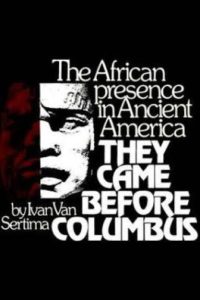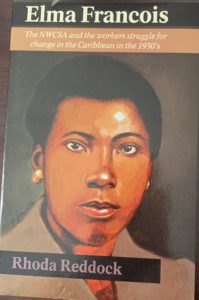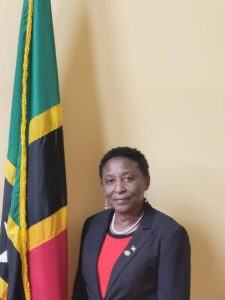|
Getting your Trinity Audio player ready...
|
Reading Time 5 mins
April 8, 2022
GENDER EQUALITY TODAY FOR A SUSTAINABLE TOMORROW
I am deeply honoured to be participating in this virtual event amongst my African sisters during the month of “Her-Story,” just five days after the International Day of Remembrance of the Victims of Slavery under the theme “Stories of Courage: Resistance to Slavery and Unity against Racism.”
One such story is that of Nanny of the Maroons.
Nanny was born c. 1686 in Ghana into the Ashanti ethnic group. Along with several relatives, she was enslaved and sent to Jamaica. Nanny, along with her brothers escaped to the hills and became very adept at organizing plans to free the Africans. Over 30 years, she freed more than 800 enslaved people and helped them resettle in the Maroon Community.
Another story of courage is Betto Douglas, born in St Kitts and Nevis around 1772 to a white father and an African mother. Having been denied the freedom to which she was entitled and promised around 1817, Douglas petitioned the local governor in 1825 and took her case to the London colonial court in 1827. Her case was taken up by abolitionists worldwide. The Female Society for the Relief of British Negro Slaves collected funds in 1830 to buy her freedom, yet the Lord Proprietor denied her petition. Despite persecution and hardship, including starvation and being “locked away,” she never gave up. Douglas was finally granted manumission after 15 years of struggle just three months before the Abolition Act passed in July 1833.
These stories and many more demonstrate the resilience, talent, and tenacity of these women, who obviously considered themselves not only equal to any task, but equal before the law. This boldness and confidence belied the realities of the day for the average woman of the Caribbean. Eintou Pearl Springer, librarian author from Trinidad and Tobago, writes, “The male slave could neither protect nor provide for his family…Marriage was not recognized, nor were stable relationships encouraged.” Thus in the Afro-descendant population, societies then and over the decades were matrifocal, a structure so famously outlined by Edith Clarke in her famous book “My Mother Who Fathered Me.”
But the Caribbean is a rich and colourful admixture of the people who came (including those who came before Columbus, highlighted in the historical book by  Dr. Van Sertima) and the people they met. The experience of women of the East Indian and indigenous families was different. These family structures were mainly extended and multi-generational.
Dr. Van Sertima) and the people they met. The experience of women of the East Indian and indigenous families was different. These family structures were mainly extended and multi-generational.
Nonetheless, within this multicultural multi-genotypic potpourri of peoples, Caribbean women are known for their strength and resilience as CEO’s of their households and stalwarts in their communities, and political party machineries. Yet, consonant with the situation throughout the world, our women still battle inequality, particularly in the political and economic spheres, even though we have made great strides health-wise and educationally.
However, throughout the decades, champions in the spirit of the Ashanti queen Nana Yaa Asantewa have arisen. Women like Dame Nita Barrow of Barbados are acclaimed for their active involvement in and strong advocacy for women’s rights. A nurse by profession, she was appointed Director of the Global Forum for Women during the Decade of Women designated in 1976. She seized the global platform to promote the interests of women.
*Ann Liburd was an Antiguan-Kittitian women’s rights activist and community organizer. She served as president of the National Council of Women in St. Kitts. She was the first president of the Caribbean Women’s Association (CARIWA), an organization formed in 1970 to collectively mobilize and unite women and women’s organizations throughout the region.
*Nelcia Robinson-Hazell is a Vincentian poet of Carib descent, community organizer, and activist. In the 1980s, she spearheaded the development of policy initiatives throughout the Caribbean on issues regarding gender and indigenous identity. Finding the typical Caribbean data desert, she became involved in creating local and regional organizations to analyze and develop information about the socio-economic and political inequalities women faced.
 *Dr. Rhoda Reddock, Professor of Gender, Social Change and Development and former Deputy Principal of The University of the West Indies (UWI), St. Augustine Campus in Trinidad and Tobago. Prof. Reddock dedicated her scholarship and teaching to women and development in the Caribbean Community and served as Head of the Institute for Gender and Development Studies from 1994 to 2014.
*Dr. Rhoda Reddock, Professor of Gender, Social Change and Development and former Deputy Principal of The University of the West Indies (UWI), St. Augustine Campus in Trinidad and Tobago. Prof. Reddock dedicated her scholarship and teaching to women and development in the Caribbean Community and served as Head of the Institute for Gender and Development Studies from 1994 to 2014.
*The Hon. Olivia’ Babsy’ Grange of Jamaica, Minister of Youth, Sports & Culture, Women and Gender Affairs. Minister Grange has a long career as a community activist and politician committed to promoting youth and women’s affairs with a particular focus on job creation and improved healthcare. A former journalist, she co-founded Contrast, Canada’s first black community newspaper.
Time does not permit me to elaborate on many other illustrious women of the Caribbean, such as the late Dame Hilda Bynoe, former governor of Grenada; Dr. Carissa Etienne of Dominica, PAHO Director; Mrs.Valerie Woods Smith
of Belize, Speaker of the House of Representatives; Dame Constance Mitcham of St Kitts and Nevis, the first Minister of Gender Affairs and of course, Prime Minister Mia Mottley of Barbados.
Notwithstanding the efforts of these and other torchbearers, statistics such as the Gender Inequality and the Women Business and the Law indices demonstrate that we still have a hard row to hoe and a long way to go! This is although it has been clearly shown that “Empowering women and girls is not only the right thing to do: It’s also smart economics and vital to ending poverty and boosting shared prosperity.”
We, as women, and particularly as Black women, must study and internalize our history and teach it to our children, for it’s in the appreciation of our story that we are enabled to chart our own course to the equality into which we were created as “help-mates parallel to” our menfolk. (Gen 2:18). I must add that as mothers socialize children, we have to begin raising our girls and boys to appreciate that we are different biologically but equally valuable and complementary to each other.
Secondly that we encourage our girls to enroll in STEM subjects, since “only about 30 percent of all female students select STEM-related fields in higher education and even fewer pursue Doctoral degrees or hold leadership positions. The gender gaps are particularly high in some of the fastest-growing and highest-paid future jobs, like computer science and engineering. We must move beyond gender biases and stereotypes that discourage our girls from fields that would provide financial empowerment.”
My sisters, the battle begins in our minds, and the time to start was yesterday! I, therefore, leave you with a plea based on FEMALE as an acronym.
Let us Free and Educate our Minds. Let us Aspire to Leverage our collective Expertise to achieve gender equality today for a sustainable tomorrow.

Thelma Phillip-Browne, a medical doctor, is Ambassador to the US from St Kitts and Nevis. Dr. Philip-Browne, a graduate of the University of the West Indies (UWI) Mona, Jamaica, received training in Public Health at the John Hopkins University School of Medicine and is also a graduate of the Cardiff University School of Medicine in Wales, with a Diploma in Dermatological Science. Ambassador Phillip-Browne, a political activist, is a founding member of the United National Empowerment Party (UNEP) and the Peoples Labour Party (PLP). A born-again Christian, Ambassador Phillip-Browne also obtained a Master of Theological Science (MTS) degree from Anderson University, Indiana in 2011.
